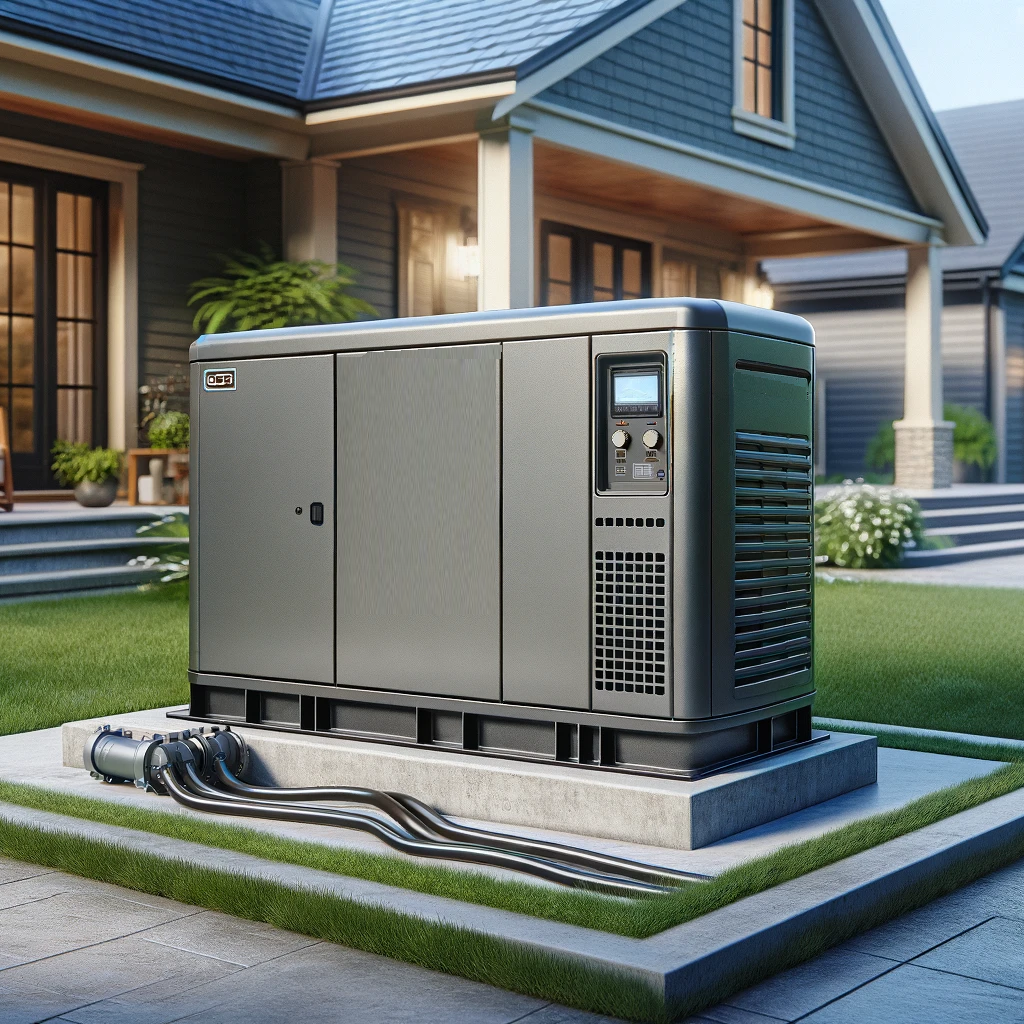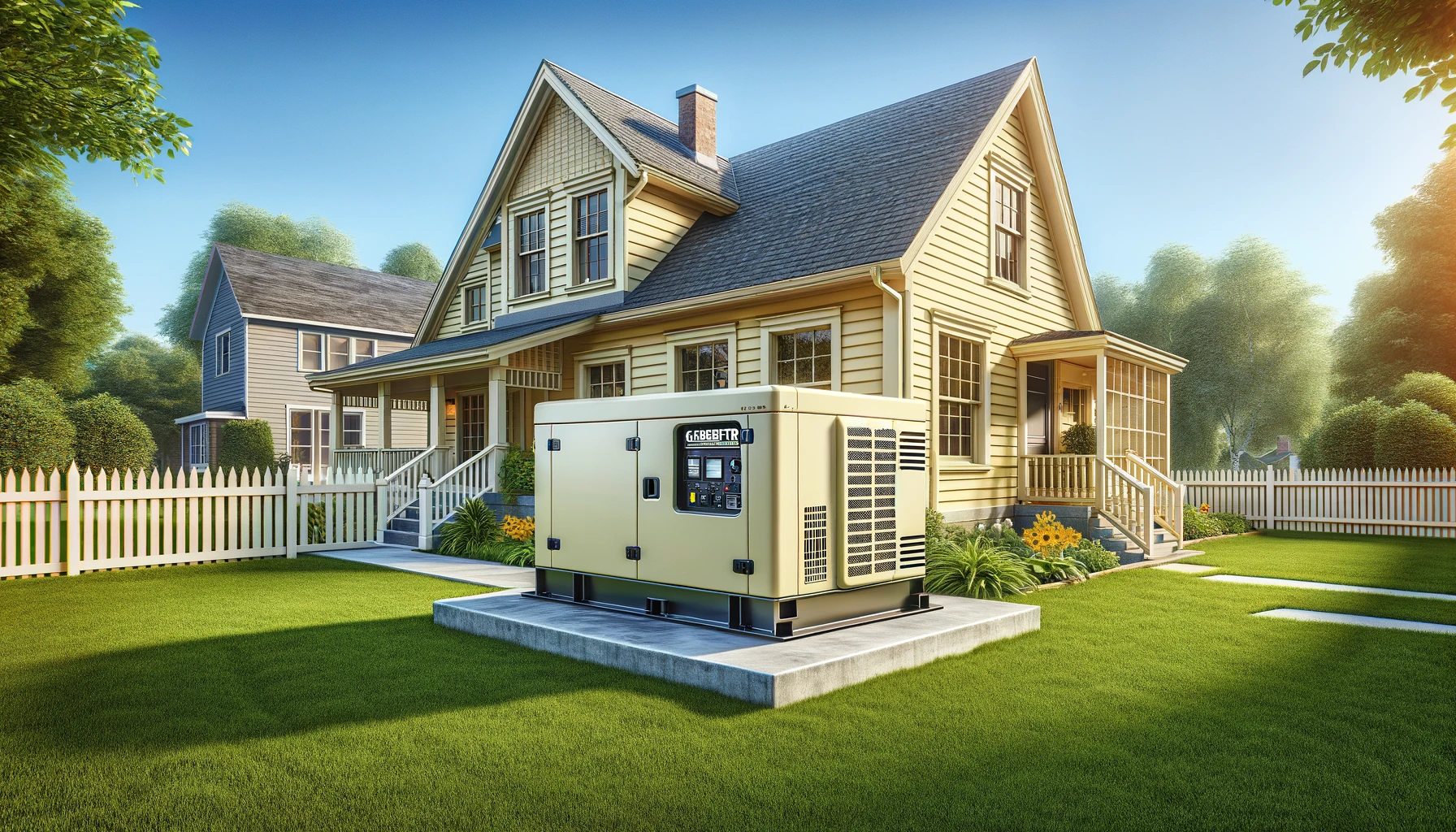Install a whole home generator!
Why Should You Invest in a Whole Home Generator in 2024?
Had enough of unexpected power outages throwing your day into chaos? Want to ensure that your home remains powered and secure, no matter what? The solution you're looking for might just be a whole home generator. From stormy weather to equipment breakdowns to grid overloads, a whole home generator ensures continuous power supply, so you can keep the lights on, appliances working, and essential systems running smoothly.
This article aims to shed light on the various benefits of whole home generators and why you should consider installing one. We'll discuss everything you need to know about whole home generators, how to determine the right generator size for your home, installation and maintenance aspects, and the costs involved. Lastly, we'll emphasize why Sears Home Services is your go-to choice for all your whole home generator needs.
KEY TAKEAWAYS
- No matter where you live, you’re always at risk for loss of electrical power.
- Learn the reasons why you need a whole home back-up generator.
- Prepare now for potential power outages by scheduling a free in-home consultation with a Sears Home Services generator expert.
All About Whole Home Generators
A whole home generator is an emergency power system designed to supply electricity to your entire home during a power outage. It's a wise investment that guarantees power whenever you need it.
So, how does a whole home generator work? These generators are typically wired into your home's electrical system and powered by an external fuel source, such as natural gas or propane. In the event of a power failure, the generator automatically kicks in and starts supplying electricity. This power is then routed to your home, restoring electricity to all your appliances and devices.
There are different types of whole home generators available in the market. Standby generators are a popular choice among homeowners. They are permanently installed outside your home and automatically turn on during power outages. Portable generators, however, are more flexible and can be moved around as needed. They require manual setup and connection to your home's electrical panel.
Having a whole home generator offers various benefits. It gives you peace of mind knowing you won't be left in the dark during a power outage. You can continue to power vital appliances like refrigerators, heating and cooling systems, medical equipment, and security systems. This is particularly important for homes with young children, elderly members, or individuals with medical conditions.
Besides, a whole home generator helps protect your home from potential damage. During power outages, sump pumps may fail, resulting in basement flooding. With a generator, you can ensure these critical systems continue to work, preventing expensive repairs and inconvenience.
In a nutshell, a whole home generator is an investment that provides dependable backup power during outages. With different models to choose from and numerous benefits, it's a smart choice for homeowners who value comfort, safety, and peace of mind.
Choosing the Right Generator Capacity
Investing in a whole home generator requires careful consideration of the generator's capacity. Determining the right generator size for your home ensures you have enough power to keep your essential appliances and systems running during a power outage.
To calculate your home's power needs, assess the electrical requirements of the appliances and systems you need during an outage. Start by listing all the essential items you can't do without, such as the refrigerator, heating or cooling systems, sump pump, lights, and any medical equipment that needs electricity.
Once you have a comprehensive list, find out the wattage or kilowatt (kW) rating for each item. This information is usually found on the product label or in the owner's manual. Add up the total wattage or kW for all the items to get an estimate of the power capacity your generator needs to provide.
Selecting the right generator capacity involves choosing a generator that can handle your estimated power needs. Remember that generators come in various sizes, typically ranging from 7 kW to 22 kW or more. Choosing a generator with too low of a capacity might result in inadequate power during an outage, while one with excessive capacity could lead to wasted resources.
Factors to consider when sizing your whole home generator include your budget, the size of your home, the number of appliances and systems you want to power at the same time, and the specific power requirements of each item. Consulting with a professional generator installer can help you make an informed decision and ensure you choose a generator with the right capacity for your home.

Considerations for Installation and Maintenance
When thinking about installing a whole home generator, several important factors should be considered to ensure its proper operation and longevity. Let's delve into key considerations relating to professional installation vs. DIY, permitting and electrical requirements, as well as maintenance and servicing of whole home generators.
Professional Installation vs. DIY
While installing a whole home generator may seem like a project you can handle, it's generally best to hire a professional. Professionals have the expertise and knowledge to correctly assess your home's electrical needs, determine the appropriate generator size, and ensure proper wiring and connections. They can also help you navigate any local building codes or regulations that may apply.
Permits and Electrical Requirements
Installing a whole home generator often requires obtaining necessary permits from your local authorities. These permits ensure the installation meets safety standards and electrical codes. A professional installer will handle this process for you, saving you time and ensuring compliance. They will also ensure your generator is correctly connected to your home's electrical system for a seamless switch during a power outage.
Maintenance and Servicing of Whole Home Generators
Regular maintenance is crucial to keep your whole home generator operating smoothly and reliably. Manufacturers typically recommend annual maintenance checks to inspect and clean components, test the system, and ensure it's ready to perform when needed. Professional technicians can identify potential issues and provide necessary repairs or replacements. Regular servicing can extend your generator's lifespan and minimize the risk of unexpected breakdowns.
At Sears Home Services, we understand the importance of a properly installed and well-maintained whole home generator. Our team of experienced professionals is ready to assist you throughout the entire process, from choosing the right generator for your home to ensuring a seamless installation and providing ongoing maintenance. Contact us today to learn more about how a whole home generator can give you peace of-mind and reliable power during outages.
Understanding the Cost of Whole Home Generators
When considering installing a whole home generator, it's important to understand the factors that can influence its cost. With a clear understanding of these factors, you can make an informed decision that aligns with your budget and needs.
The primary factor influencing the cost of a whole home generator is its size and power capacity. The larger the generator and the more power it can produce, the higher the cost will generally be. Additionally, the type of fuel the generator uses can also impact its price. Propane and natural gas generators tend to be more expensive upfront compared to diesel or gasoline generators.
Another important consideration is the brand and model of the generator. Different manufacturers offer a range of generator models with various features and capabilities. It's essential to compare the costs of different models to find the one that best meets your requirements.
While the initial cost of a whole home generator may seem significant, it's important to consider the long-term savings and return on investment. During power outages, a generator can keep your essential appliances running, preventing food spoilage, protecting your home's security system, and maintaining a comfortable living environment. This can potentially save you from costly repairs or replacements.
Moreover, a whole home generator can increase the resale value of your property. Potential buyers appreciate the peace of-mind that comes with a reliable backup power source. It's an investment that can pay off in the future.
Why Choose Sears Home Services to Install Your Whole Home Generator
When it comes to installing a whole home generator, you want to ensure that the job is done right. That's why Sears Home Services is the ideal choice for all your generator installation needs.
With our wealth of experience and expertise in generator installation, our team of professionals understands the complexities of setting up a reliable power backup system for your entire home. We've successfully installed numerous generators, providing peace of-mind to homeowners nationwide.
At Sears Home Services, we only work with quality products and reliable brands. We understand that a whole home generator is a substantial investment, and you deserve nothing but the best. That's why we partner with trusted manufacturers renowned for their top-notch generator systems. Our selection includes the industry's top brands known for their durability, efficiency, and performance.
One of the main reasons our customers choose us is our exceptional customer service and support. We believe in going above and beyond to ensure your experience with us is seamless from start to finish. Our knowledgeable customer service representatives are on hand to answer any questions you may have, guide you through the selection process, and provide ongoing support even after the installation is complete.
When it comes to your home's power needs, don't settle for anything less than the best. Choose Sears Home Services for your whole home generator installation and enjoy peace-of-mind knowing you have a reliable backup power solution in place. Schedule a free in-home consultation with a Sears Home Services Generator Expert now.
Install a whole home generator!
Have a backup when the power goes out. Get a free estimate so your home is prepared for the next power outage.
Was this information helpful?
Improve Generator Resources
Ensure uninterrupted power on game day with a reliable home generator.
Don't be left in the dark! Embrace the spirit of the solar eclipse and the importance of backup electrical power.
Find out the best brand of whole home generator at Sears Home Services.
Find the ideal size of back-up generator for your home at Sears Home Services. Our experts will help you determine the perfect generator for your needs.
